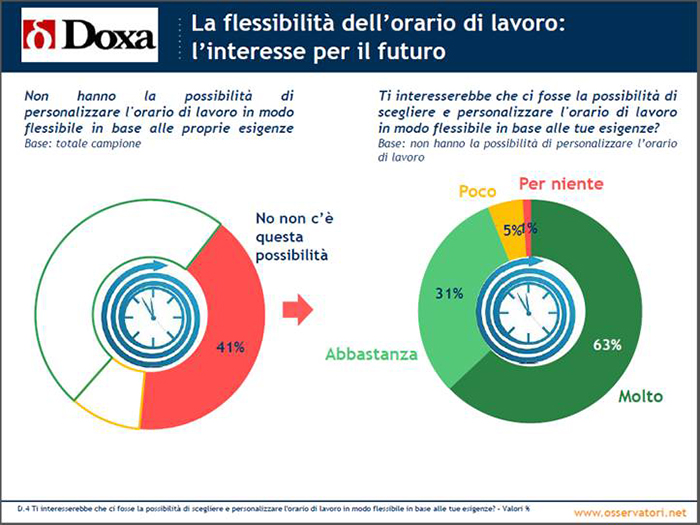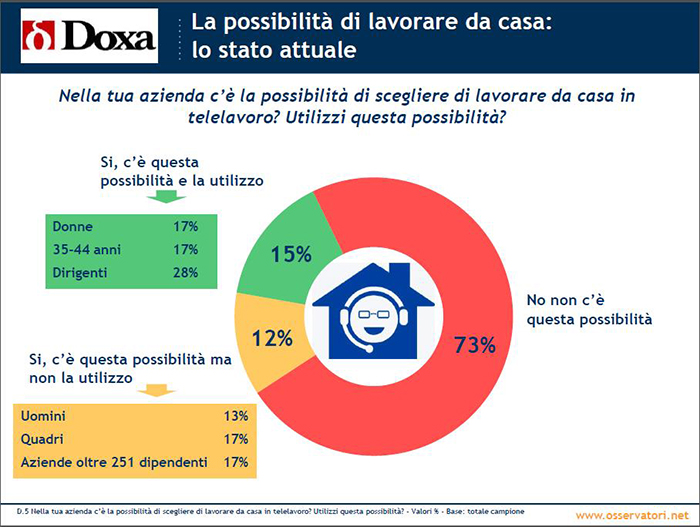Corporate well-being, as well as being provided by the valorisation of human resources, can be facilitated by the right internal communication and the adoption of efficient collaborative systems which guarantee, for example, flexible hours for training and for other company activities which increase employees’ serenity and therefore their productivity. These principles are at the base of the Skilla method for Smart Working. Unfortunately, in Italy most companies manage their human capital with classical organisational methods: the workers are required to be flexible, but they are not provided with any flexibility. Thus, we find that 25% of Italians are unsatisfied with their work hours, against only 12% of Danish people. This comes from a Doxa survey commissioned by the School of Management of the Polytechnic of Milan for the Smart Working Observatory, according to which 41% of people who work cannot personalise their working hours, even though most of them would be interested in this and they would be more productive if they could do so, perhaps even working from home. I would like to share a quote from Churchill made at the beginning of the century: “We shape our buildings, thereafter they shape us”. Technology has always been the variable with which organisational changes are made but nowadays we must also deal with speed and because of this, the organisation can quickly become an obsolete technology. Contemporary production methods can be used at any time of the day and, potentially, in any place. It is likely that Taylor and Ford’s organisational models, which we cannot dispute, would have been completely different if they had had current technology at their disposition. They would have provided greater personalisation of hours, more productivity, telework, heterogeneous workgroups, greater flexibility and responsibility of the workers, a different conception of workspace, adoption of the latest generation of collaborative tools, etc…  Going back to the research, working from home is a taboo subject in Italy: for 73% of workers it is a possibility that simply does not exist, whilst for the companies it is a missed opportunity to have employees who work better, are more productive, collaborative and proactive because they are more relaxed.
Going back to the research, working from home is a taboo subject in Italy: for 73% of workers it is a possibility that simply does not exist, whilst for the companies it is a missed opportunity to have employees who work better, are more productive, collaborative and proactive because they are more relaxed.  The application of flexible working hours and teleworking, which are among the principle pillars of Smart Working, may seem easier and more feasible in companies providing IT services but this isn’t true: there are various examples of companies who produce material goods and among these we can mention the case of Tetrapack (unfortunately not with a completely Italian management), which is presented by the Smart Working Observatory. The HR director of Tetrapack has highlighted a fundamental criterion for Smart Working projects: long term vision. The company has chosen to offer its employees greater flexibility in terms of work place and hours in exchange for responsibility, collaboration and continuous learning. Of this engineering company’s 900 employees, only 50% goes to work every day, but everyone accesses the intranet site to work, collaborate, learn…in short, to produce. The company’s office work spaces are designed to be flexible, with mobile walls, windows and soundproofing to accommodate constant change. The entire organisational structure has been calibrated on the numeric variety of employees and their displacements, with printers and paper materials placed on desks only when necessary, integrated logistics, and management of reservations for offices and meeting rooms carried out on smart phones. The management of the company’s labourers and their work also falls within the criteria of Smart Working: in the industrial area a structure has been created called the “Smart Building”, which is similar to a Campus and whose method of use is proposed by the employees themselves. In every department Taylor and Ford’s totems have been eliminated: namely, clocks. Everyone can work remotely or on-site when and how they see fit. Everyone reads their emails at home and can organise their work activities according to their availability and needs, in accordance with production priorities. This approach from Tetrapack’s HR director is how the future of all our companies should be, focusing on simplicity, transparency and trust. If 95% of people are honest workers, companies should be encouraged to facilitate their work, instead of making everyone work badly in order to protect the remaining 5%. Silvio Filippi
The application of flexible working hours and teleworking, which are among the principle pillars of Smart Working, may seem easier and more feasible in companies providing IT services but this isn’t true: there are various examples of companies who produce material goods and among these we can mention the case of Tetrapack (unfortunately not with a completely Italian management), which is presented by the Smart Working Observatory. The HR director of Tetrapack has highlighted a fundamental criterion for Smart Working projects: long term vision. The company has chosen to offer its employees greater flexibility in terms of work place and hours in exchange for responsibility, collaboration and continuous learning. Of this engineering company’s 900 employees, only 50% goes to work every day, but everyone accesses the intranet site to work, collaborate, learn…in short, to produce. The company’s office work spaces are designed to be flexible, with mobile walls, windows and soundproofing to accommodate constant change. The entire organisational structure has been calibrated on the numeric variety of employees and their displacements, with printers and paper materials placed on desks only when necessary, integrated logistics, and management of reservations for offices and meeting rooms carried out on smart phones. The management of the company’s labourers and their work also falls within the criteria of Smart Working: in the industrial area a structure has been created called the “Smart Building”, which is similar to a Campus and whose method of use is proposed by the employees themselves. In every department Taylor and Ford’s totems have been eliminated: namely, clocks. Everyone can work remotely or on-site when and how they see fit. Everyone reads their emails at home and can organise their work activities according to their availability and needs, in accordance with production priorities. This approach from Tetrapack’s HR director is how the future of all our companies should be, focusing on simplicity, transparency and trust. If 95% of people are honest workers, companies should be encouraged to facilitate their work, instead of making everyone work badly in order to protect the remaining 5%. Silvio Filippi
insights